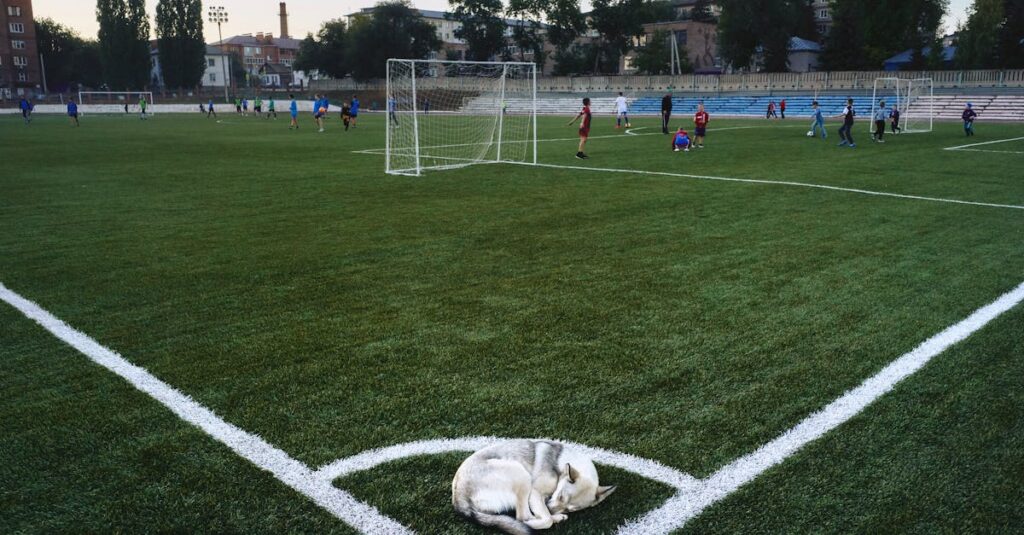In a world where distractions abound, goal setting games offer a fun and effective way to sharpen focus and boost motivation. These engaging activities help individuals and teams define their objectives while turning the often daunting process of goal setting into an enjoyable experience. By incorporating elements of play, they create an environment that encourages creativity and collaboration.
Whether it’s for personal development or team-building, goal setting games can transform aspirations into actionable plans. They not only clarify what participants want to achieve but also foster accountability and camaraderie. As more people seek innovative methods to reach their goals, these games are becoming essential tools for success in both personal and professional settings.
Goal Setting Games
 Goal setting games function as effective tools designed to transform personal and professional aspirations into structured plans. These games often incorporate interactive and engaging elements that stimulate creativity, encourage collaboration, and promote focus. Participants can visualize their objectives clearly while enjoying the process.
Goal setting games function as effective tools designed to transform personal and professional aspirations into structured plans. These games often incorporate interactive and engaging elements that stimulate creativity, encourage collaboration, and promote focus. Participants can visualize their objectives clearly while enjoying the process.
- Vision Board Sessions: Players create visual representations of their goals using images and words.
- SMART Goals Challenge: Individuals or teams outline Specific, Measurable, Achievable, Relevant, and Time-bound goals.
- Goal Mapping: Users develop a roadmap tracing steps and milestones necessary to achieve targets.
Benefits of Goal Setting Games
- Enhances Focus: Engaging in these activities directs attention toward goal achievement.
- Fosters Accountability: Participants commit to sharing their goals, enhancing motivation and follow-through.
- Promotes Collaboration: Group activities encourage support and idea sharing among team members.
- Personal Development: Individuals utilize these games to structure personal growth and self-improvement.
- Workshops and Retreats: Facilitators integrate goal setting games into sessions to enhance participant engagement.
- Corporate Training: Organizations incorporate them to boost team dynamics and inspire collective goal achievement.
Goal setting games offer a strategic approach to setting and reaching objectives. By blending structure with fun, they create an environment conducive to both individual and collaborative success.
Benefits Of Goal Setting Games
 Goal setting games offer significant advantages in personal and professional environments. They effectively boost motivation and focus, transforming aspirations into actionable steps. Goal setting games encourage active participation, inspiring individuals to engage fully in the goal-setting process. They generate excitement, making the journey toward objectives enjoyable. By utilizing challenges and rewards, these games instill a sense of accomplishment that reinforces determination. Players experience enhanced commitment due to the interactive nature of the games, which results in higher success rates for achieving their goals.
Goal setting games offer significant advantages in personal and professional environments. They effectively boost motivation and focus, transforming aspirations into actionable steps. Goal setting games encourage active participation, inspiring individuals to engage fully in the goal-setting process. They generate excitement, making the journey toward objectives enjoyable. By utilizing challenges and rewards, these games instill a sense of accomplishment that reinforces determination. Players experience enhanced commitment due to the interactive nature of the games, which results in higher success rates for achieving their goals.
Goal setting games help sharpen focus by directing attention to specific objectives. They break down complex goals into manageable tasks, simplifying the pathway to achievement. With structured activities, individuals prioritize their efforts better, reducing distractions. Setting clear intentions and immediate tasks allows players to track progress and make adjustments as needed, ensuring sustained concentration on their goals.
Types Of Goal Setting Games
Various types of goal setting games cater to both individuals and groups, each providing unique strategies for defining and achieving objectives. These games foster engagement and create pathways toward actionable success.
Individual Games
Individual games focus on personal goal setting, promoting self-reflection and personal accountability. Examples include:
- Vision Board Creation: Participants visualize goals through images and words, creating a physical representation of aspirations.
- SMART Goals Formulation: Individuals develop Specific, Measurable, Achievable, Relevant, and Time-bound goals, enhancing clarity and focus.
- Daily Goal Journals: Users maintain journals to outline daily objectives, track progress, and reflect on achievements, fostering consistency.
- Goal Mapping: Players create mind maps, illustrating connections between larger goals and smaller tasks for structured progress.
Group Games
Group games encourage collaboration and shared accountability, promoting teamwork in the goal-setting process. Examples include:
- Goal-Setting Workshops: Participants engage in group discussions, collaborating on ideas and supporting each other’s goal development.
- Group Accountability Circles: Teams meet regularly to share goals, provide feedback, and celebrate milestones, creating a supportive environment.
- Challenge Events: Groups compete to achieve specific objectives within a set timeframe, enhancing motivation and camaraderie.
- Team Vision Board Sessions: Teams collectively design vision boards, aligning individual goals with group objectives, fostering unity and clarity.
These goal setting games are instrumental in enhancing both individual focus and collaborative effort, driving participants toward successful outcomes.
How To Incorporate Goal Setting Games Into Your Routine
Incorporating goal setting games into a daily or weekly routine enhances engagement and effectiveness. Here are strategies for seamlessly integrating these interactive activities:
- Schedule Regular Sessions: Allocate specific times weekly dedicated to goal setting games. Consistency fosters a habit, making goal setting a regular part of life.
- Utilize Team Meetings: Integrate goal setting games into team meetings or workshops. This approach promotes collaborative goal development and reinforces team accountability.
- Mix Individual and Group Activities: Alternate between individual and group goal setting games. This balance allows for personal reflection while also benefiting from collective input.
- Set Clear Objectives: Define specific objectives for each game session. Clear goals help participants understand their purpose, enhancing motivation and focus during the activity.
- Create a Comfortable Environment: Establish a welcoming and engaging space for participants. Comfort encourages creativity and open communication, essential for successful goal setting.
- Incorporate Technology: Use digital tools or apps that facilitate goal setting games. Technology simplifies tracking progress and sharing results among participants.
- Encourage Reflection: After each session, include time for participants to reflect on their experiences. Reflection helps solidify learning and adjust future approaches to goal setting.
- Celebrate Achievements: Acknowledge and celebrate milestones reached through goal setting games. Recognition boosts motivation and encourages continued participation.
By implementing these strategies, individuals and teams can effectively incorporate goal setting games into their routines, enhancing focus, accountability, and overall success in achieving their aspirations.
Tips For Effective Goal Setting Through Games
- Schedule Regular Sessions: Establish a consistent schedule for goal setting games, such as weekly or monthly meetings. Regularity maintains momentum and reinforces commitment.
- Utilize Team Meetings: Incorporate goal setting games into existing team meetings. This approach maximizes participation and aligns individual objectives with team goals.
- Alternate Activities: Vary between individual and group games to keep participants engaged. Mixing formats enhances the experience and caters to different preference styles.
- Set Clear Objectives: Define specific goals before each game session. Clarity provides direction and helps participants stay focused on desired outcomes.
- Create a Comfortable Environment: Ensure spaces for game sessions are welcoming and free from distractions. A relaxed atmosphere encourages open communication and creativity.
- Incorporate Technology: Use apps or online platforms to enhance the gaming experience. Digital tools can facilitate tracking progress and maintaining engagement.
- Encourage Reflection: Allow time for participants to reflect on their experiences after each game. Reflection fosters insight, helping individuals connect activities to personal growth.
- Celebrate Achievements: Recognize and celebrate milestones achieved through game participation. Celebrations create a sense of accomplishment and motivate continued efforts.
- Foster Collaboration: Design group games that emphasize teamwork and collective accountability. Cooperation strengthens bonds and enhances the success of goal-setting efforts.
- Adapt Games to Different Styles: Tailor games to suit the preferences of participants. Customization improves engagement and allows for personal connections to goals.
Goal setting games offer a dynamic approach to turning aspirations into reality. By making the process engaging and interactive they foster a sense of accountability and collaboration that can significantly enhance motivation. Individuals and teams can benefit from incorporating these games into their routines as they create structured pathways toward achieving their goals.
As people increasingly seek innovative methods for personal and professional growth these games stand out as effective tools. The blend of creativity and strategy not only makes goal setting enjoyable but also reinforces focus and determination. Embracing goal setting games can transform the way individuals approach their objectives leading to greater success and fulfillment.


